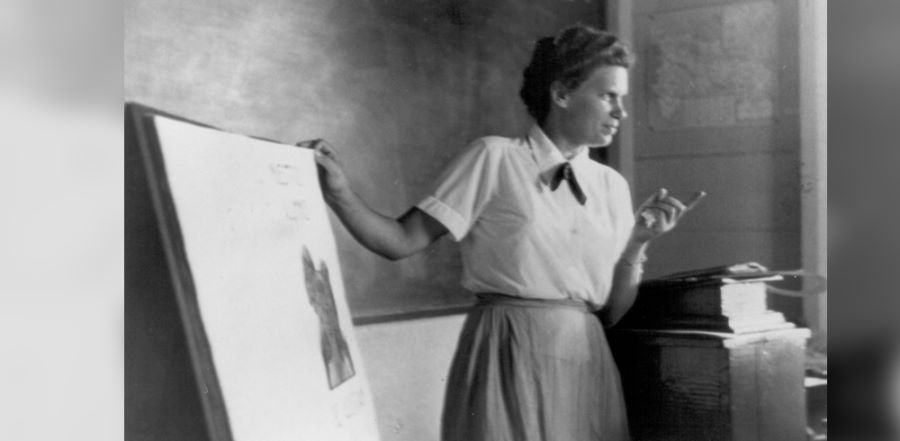Adele Flower Dalton: Pioneer Assemblies of God Writer, Editor, Teacher, Missionary and Archivist
This Week in AG History–October 17, 1954 By Ruthie Edgerly Oberg Originally published on AG News, 19 October 2023 Alice Adele Flower Dalton (1915-2006) was born into the hustle and bustle of the formative years of the Assemblies of God. Never … Continue reading

This Week in AG History–October 17, 1954
By Ruthie Edgerly Oberg
Originally published on AG News, 19 October 2023
Alice Adele Flower Dalton (1915-2006) was born into the hustle and bustle of the formative years of the Assemblies of God. Never one to wait on opportunities to present themselves, she created them – finding work to be done, stories to be written, and people to teach about the saving message of the Gospel of Jesus Christ.
Flower’s birth came less than one year after the birth of the Assemblies of God. Her parents, J. Roswell and Alice Reynolds Flower, were instrumental in the early leadership of the new Movement. When Adele was 3 years old, they made the move to Springfield, Missouri. Their home was full of the excitement of ministers coming and going, bringing reports of all that God was doing through the Pentecostal churches and missions stations that were springing up both in the United States and around the world.
A few years later, Flower’s father took a pastorate in Scranton, Pennsylvania, and then became superintendent of the Eastern District. She graduated from high school in Lititz, Pennsylvania, and soon enrolled at Central Bible Institute back in Springfield, finishing the three-year program in 1936. While there, she worked in the editorial department of Gospel Publishing House, writing Sunday School lessons that were being taught across the country.
During these years, Flower learned to be ready to respond to whatever need would present itself and to tackle it without reservation. In her time between classes and editorial work, she assisted in prison outreach at the Missouri State Penitentiary, where the leader would often call on her to teach with no advance preparation.
At the 1943 General Council, held in Springfield, Missouri, it happened that the scheduled speaker for the Friday afternoon session was not in attendance. Not knowing what else to do, the leader of the meeting called on Adele Flower and three other young women from the editorial staff to give an impromptu address on the various phases of the Sunday School work. Notes from the General Council reported that “this was of great interest to the whole congregation, who were happy to make acquaintance with these earnest young workers who are ministering to them week by week through our Sunday School quarterlies.”
Later that year, Flower offered herself to the foreign missions department and was sent to Los Angeles and then Mexico City to study Spanish. In 1945, she and Marjorie Trulin ministered in Guatemala, establishing Sunday Schools and teaching women and children. In 1948, Flower was tasked to serve as Sunday School director for all Latin America. This led her to work with establishing conferences and training centers for teachers in numerous countries.
To aid in the accomplishment of the huge task before her, Flower returned to Central Bible Institute for the recently added fourth year of studies in 1949. Given the opportunity to speak in the Feb. 4th chapel service, she spoke on the power of the transformed mind. It was reported that after she spoke “a spirit of prayer and worship seized the students. The pressure of the Spirit of God upon everyone was so great that the routine of school life was gloriously interrupted. All classes were merged into one large class in the chapel, with the Holy Spirit Himself as Teacher and hours slipped by as if they were minutes.”
The Oct. 17, 1954, issue of the Pentecostal Evangel stated that Flower was continuing her work in Latin America, spending time “in Sunday School conventions and C.A. rallies in Puerto Rico and the Dominican Republic. She has now gone to Venezuela, South America, where she will spend this term teaching in the Bible School.” Flower’s schedule often had her teaching 30 or more meetings a month – all in Spanish.
In 1956, Flower was scheduled to teach at the Bible Institute in Puerto Rico. While there she enrolled for a summer term at the University of Rio Piedras, to learn more about Spanish history and literature. Her heart was captured with the history of Spain and its influence around the world. After she finished these courses, a crisis on the field caused her to return to the United States.
Flower was completely unaware that another missionary, Roy Dalton, was also planning to be in the United States at the same time. The two had briefly corresponded several years earlier but had not made contact for more than five years. Dalton, serving alone in Spain, had reached his own crisis. He was the first American Assemblies of God missionary in the country and had managed to convert not only many Spaniards, but also a chicken shed into a small church. However, he found the task overwhelming and did not feel that he could face another term in Spain alone.
Upon finding that both he and Flower were in Springfield at the same time, he decided to place a “fleece” before the Lord: “I’ll call her on the phone. If she invites me to go to see her, I’ll accept it as a sign that there is some hope for our future together. Otherwise, I’ll accept the matter as finished.” When Flower answered the phone and said, “Roy, I’d like to see you. Can’t you come over to the house?,” he was there within five minutes.
Less than three weeks later, in the crowded hallway of a hotel at the 1957 General Council in Cleveland, Ohio, Dalton asked Flower if she realized what God had done in bringing them both to Springfield at the same time. When she nodded yes, he asked the question, “Will you return with me to Spain?”
Dalton and Flower were married in December 1957 and the next January arrived at the small house Dalton lived in next to the converted chicken shed. While Flower had to adjust to the Spanish dialect of her new home in Ronda, Spain, she quickly adapted and soon their ministry together began to flourish as Flower’s gift for teaching and discipleship blended with Dalton’s gift for friendship evangelism.
In God’s providence, just 10 years later, Dalton was diagnosed with an aggressive form of cancer. Together they continued to lead the church in Ronda, but Roy passed into the presence of Jesus in June of 1968. After his death, Adele Flower Dalton remained in Spain, serving as director of the nation’s International Correspondence Institute (now Global University), until she returned to Springfield in 1976. There she served as a researcher and writer for Assemblies of God World Missions. She also established the AGWM archives, a repository of materials relating to the AG USA’s missions work around the world.
When the Flower Pentecostal Heritage Center, also located in the AG national office, dedicated its new research facilities in 1999, it was only fitting to name its research room in her honor, recognizing her dedicated work that would benefit researchers for many years. Flower-Dalton passed away in 2006 and is buried in Springfield, Missouri where her family first moved to serve the Assemblies of God in 1919.
Read a brief report of Flower-Dalton’s work on page 7 of the Oct. 17, 1954, issue of the Pentecostal Evangel.
Also featured in this issue
• “Afire in the Sky” by Chaplain Neville E. Carlson
• “Let Us Not Lose Heart” by Thomas F. Zimmerman
And many more!
Click here to read this issue now.
Pentecostal Evangel archived editions courtesy of the Flower Pentecostal Heritage Center.
Do you have Pentecostal historical materials that should be preserved? Please consider depositing these materials at the Flower Pentecostal Heritage Center (FPHC). The FPHC, located in the Assemblies of God national offices, is the largest Pentecostal archive in the world. We would like to preserve and make your treasures accessible to those who write the history books.
Flower Pentecostal Heritage Center
1445 North Boonville Avenue
Springfield, Missouri 65802 USA
Phone: 417.862.1447 ext. 4400
Toll Free: 877.840.5200
Email: archives@ag.org
Website: www.iFPHC.org
